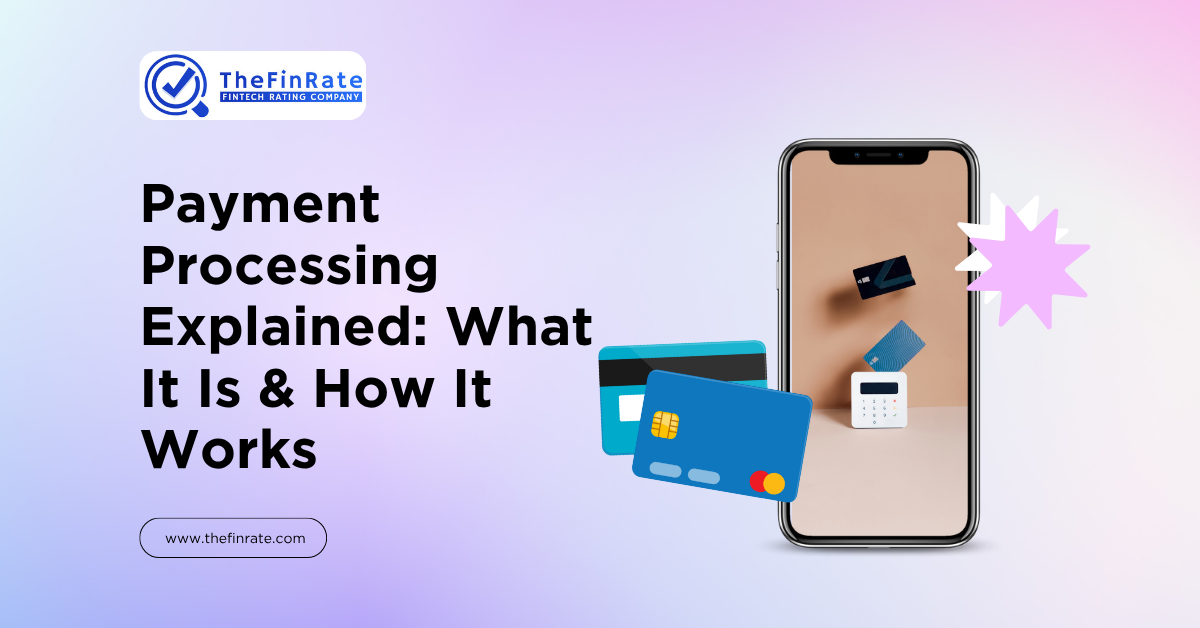1. What Is Payment Processing?
Payment processing refers to the system that handles financial transactions between a customer and a merchant. It allows businesses to accept payments via credit/debit cards, mobile wallets, bank transfers, and even cryptocurrency.
It ensures that payments are fast, secure, and seamless, playing a vital role in modern commerce—especially in digital-first environments like eCommerce, SaaS, and fintech.
2. How Does Payment Processing Work?
a) Transaction Initiation
A customer initiates a transaction by entering their payment details on a website, app, or POS terminal.
b) Authorization
The payment gateway encrypts and sends the details to the payment processor, which forwards them to the card network (e.g., Visa, Mastercard).
c) Verification
The issuing bank verifies the customer’s details, checks for fraud, and either approves or declines the transaction.
d) Settlement
If approved, the amount is deducted from the customer’s account and deposited into the merchant’s account within a few days.
✅ This full process usually happens in seconds.
3. Key Players in Payment Processing
- Merchant: Accepts the payment.
- Customer: Makes the payment.
- Payment Gateway: Encrypts and forwards payment data.
- Payment Processor: Handles communication between all parties.
- Issuing Bank: The customer’s bank.
- Acquiring Bank: The merchant’s bank.
- Card Networks: Visa, Mastercard, etc.
4. Types of Payment Processing Systems
a) Card-Based Processing
The most common method. Uses Visa, Mastercard, Amex, etc.
b) ACH Transfers
Bank-to-bank payments, ideal for subscriptions and B2B.
c) Mobile Payments
UPI, Google Pay, Apple Pay—growing fast in mobile-first regions.
d) Crypto Payments
Bitcoin, Ethereum, and stablecoins—rising in niche markets.
5. Why Payment Processing Matters in 2025
- 💡 Customer Experience: Faster checkouts, fewer drop-offs.
- 🔐 Security: Protects sensitive data from fraud.
- 📊 Business Growth: Enables automation, analytics, and scaling.
- 🌍 Global Reach: Accepts payments across countries and currencies.
6. Common Challenges in Payment Processing
- ❌ Declined Transactions
- ⚠️ Chargebacks & Disputes
- 💸 High Fees
- 🛠️ Technical Integration Issues
- 🛡️ Security Risks & Compliance
7. How to Choose the Right Payment Processor
Key Factors to Consider
- Transaction fees and setup cost
- Payment method support (UPI, cards, wallets, crypto)
- API or plugin availability
- Payout speed and settlement times
- PCI DSS compliance and fraud prevention
- Customer support availability
Popular Payment Processors (2025)
| Provider | Best For | Features |
| Stripe | SaaS and global eCommerce | Advanced API, global reach |
| Razorpay | Indian businesses | UPI, GST invoices, local support |
| PayPal | SMEs and freelancers | Easy integration, buyer protection |
| Square | Retail and mobile POS | Hardware + software suite |
| Adyen | Enterprises | Multi-currency, enterprise-grade |
8. Future Trends in Payment Processing
- 🤖 AI in Fraud Detection
- 🔐 Tokenization for Security
- ⏱️ Real-Time Settlements
- 🌐 Cross-Border Payment Innovation
- 💱 Crypto & Stablecoin Acceptance
- 🧩 Embedded Finance in Apps
9. Frequently Asked Questions (FAQs)
Q1. What’s the difference between a payment gateway and a processor?
A gateway captures and encrypts payment data; the processor transmits it to banks and networks.
Q2. Are payment processors secure?
Yes, if they follow PCI-DSS standards and use tools like tokenization, encryption, and 2FA.
Q3. How long do settlements take?
Typically 1–3 business days, though UPI and instant settlement options are now available.
Q4. Can I accept payments internationally?
Yes. Choose a processor with multi-currency support and international coverage.
10. Final Thoughts
Payment processing is the backbone of digital commerce. From card swipes to crypto wallets, understanding how it works helps you deliver a frictionless payment experience.
Whether you're a fintech startup, eCommerce seller, or banking professional, choosing the right payment processing system can dramatically boost your growth in 2025.
📌 Pro Tip: At TheFinRate, we review and rank the top payment processors, gateways, and tools based on real performance. Explore our latest reviews or get personalized recommendations for your business.
